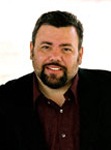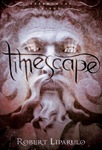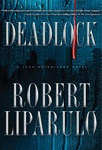Our guest today is best-selling author Robert Liparulo, a former journalist with over a thousand articles and multiple writing awards to his name. His novels include COMES A HORSEMAN, GERM, DEADFALL, and this year’s DEADLOCK, as well as the young adult series, DREAMHOUSE KINGS (the latest of which is TIMESCAPE, releases July 7). He is currently writing, simultaneously, an original screenplay and novel, with the director Andrew Davis (THE FUGITIVE, THE GUARDIAN).
 Pace. Rhythm. Tension. It’s no coincidence these terms describe both stories and music. In fact, for me, music has always helped me create stories. When someone mentions a favorite scene from one of my novels, more often than not, I immediately remember the music that was playing in my headphones when I wrote it: Olaf’s attack on Brady and his son in Comes a Horseman (“Elk Hunt” from Last of the Mohicans); Stephen’s confrontation with the killer Atropos in Germ (“The Battle” from Gladiator); Hutch’s apprehensive readiness to rise from charred ground and fight at the end of Deadfall (“Death is the Road to Awe” from The Fountain). Music gets me in the mind-set to write specific scenes—its rhythm reminds me of the pace I’m looking for as I work to find just the right words; its mood holds me in a sort of suspended animation within the scene, regardless of outside distractions or the time it takes to write it.
Pace. Rhythm. Tension. It’s no coincidence these terms describe both stories and music. In fact, for me, music has always helped me create stories. When someone mentions a favorite scene from one of my novels, more often than not, I immediately remember the music that was playing in my headphones when I wrote it: Olaf’s attack on Brady and his son in Comes a Horseman (“Elk Hunt” from Last of the Mohicans); Stephen’s confrontation with the killer Atropos in Germ (“The Battle” from Gladiator); Hutch’s apprehensive readiness to rise from charred ground and fight at the end of Deadfall (“Death is the Road to Awe” from The Fountain). Music gets me in the mind-set to write specific scenes—its rhythm reminds me of the pace I’m looking for as I work to find just the right words; its mood holds me in a sort of suspended animation within the scene, regardless of outside distractions or the time it takes to write it.
Years ago, as movie critic, I’d sometimes see films before they were finished, without a musical score. At one screening, the director stood in the aisle humming the music that would accompany each scene. That was more distracting than the film’s symphonic nakedness, but I understood the poor man’s panic over having his film seen that way: music can make or break a movie. It not only adds a rich layer of enjoyment to the viewing experience, it cues the audience to the filmmaker’s intentions—“OK, time to get scared” or “In case this guy’s mask made out of human skin isn’t enough to let you know, he’s the bad guy!” That’s why the tracks of musical score are called “cues.”
 (I’ve dreamed of including a playlist—even the actual music in digital form—with my novels. Readers could then start a soundtrack with each chapter, heightening their experience of the story. Of course, individual reading speeds make that impractical; few things are worse than out-of-synch audio tracks. And, yes, I realize it’s part of the author’s job to create the same emotional response in readers that music does, using only words. Still, I sometimes imagine myself acting like that director: leaning over a reader’s shoulder, and at the right moment going, “Da-da-da!”)
(I’ve dreamed of including a playlist—even the actual music in digital form—with my novels. Readers could then start a soundtrack with each chapter, heightening their experience of the story. Of course, individual reading speeds make that impractical; few things are worse than out-of-synch audio tracks. And, yes, I realize it’s part of the author’s job to create the same emotional response in readers that music does, using only words. Still, I sometimes imagine myself acting like that director: leaning over a reader’s shoulder, and at the right moment going, “Da-da-da!”)
It’s hard for me to experience a story, in any medium, without musical accompaniment—whether in my ears or my head.
For as long as I can remember, I’ve listened to music as I wrote—through years of writing magazine articles and intermittent screenplays. It started as a way of deadening the sounds of screaming kids, vacuum cleaners, and when I rented an outside office, the shouts coming from the divorce attorney’s office next door. Then I started writing novels, and the type of music I played suddenly mattered.
Faster tempos do help keep the pace up—if not within the story, then at least with how fast my fingers move over a keyboard; but then, volume helps with that as well. The louder, the better. More important than tempo is how a piece of music makes me feel. A cue that starts off slow and builds to a triumphant crescendo can carry me through a fast-paced action sequence as well as any nonstop, staccato rhythm. “Chevaliers de Sangreal” from The Da Vinci Code, for example: a hero’s theme if ever there was one.
Over time, I’ve built a library of music categorized by the mood it puts me in when I write. Take, for instance, Clint Mansell’s haunting music for Requiem for a Dream. Its cues seem to be teetering on the edge of something, without relief or execution. No wonder several of the titles have the word “Tense” in them. When I launch into a suspenseful scene, I’ll often queue up my Requiem playlist.
Here’s a specific example of a partial scene and the music I was listening to when I wrote it:
“With the speed and fluidity he had practiced a thousand times, Hutch drew back on the bowstring and released it, all in one, smooth two-second motion. He held still for another beat to make sure the arrow cleared the bow. Then he dropped his right arm to a second arrow rising from the ground beside him. His bow arm never moved. His head never moved. His eyes never came off of Bad. As the arrow sliced a groove through Bad’s skin at the temple, Hutch was already nocking the next arrow.”
Most likely, Quentin Tarantino would go with something fast and exotic, like NEU!’s “Super 16” from Kill Bill. Because the scene is a mix of suspense and action, I powered up “Betrayal” from Enemy at the Gates—from the scene in which they discover a young boy murdered and hanging from a crane. It’s emotive and heart-wrenching, and prior to the “discovery” almost painful in its anticipation.
My writing-music of choice is almost always film scores. It seems to me that movie moguls are the benefactors of today’s great composers, Hollywood the new Vienna. I also like that the structure of a good story—with its cycle of tension and relief, despair and triumph—forces a wide variation in music within one recording. I used to think the strong bond between a movie’s images and its music would cause me to think only of those images while listening to the score—Russell Crowe plucking his violin in Master and Commander. However, I’ve found that the spirit of the music takes over and I can claim it for my own. That’s why filmmakers often listen to other movies’ scores while on set. They’re not trying to imitate another movie’s scene; they’re letting the music help them get in the mood for their own scene. The director Ridley Scott is known for doing this.
Thankfully, most movie scores don’t have lyrics. I’m too much of a word geek to write with lyrics pounding into my eardrums: I’m always trying to listen to them. Every now and then, however, a song with lyrics is perfect for getting me into the groove of a scene (though usually it’s something in its rhythm, tempo or melody, rarely its words that attracts me to it). When that happens, I play it over and over until my mind stops  trying to catch every word and hears the vocals as it does any other instrument. Felix da Housecat’s remix of Nina Simone’s “Sinnerman” comes to mind; I listened to it while writing the scene that introduced Brendan Page, my latest novel Deadlock’s villain, a true sinnerman with a penchant for “cool,” which the song captures.
trying to catch every word and hears the vocals as it does any other instrument. Felix da Housecat’s remix of Nina Simone’s “Sinnerman” comes to mind; I listened to it while writing the scene that introduced Brendan Page, my latest novel Deadlock’s villain, a true sinnerman with a penchant for “cool,” which the song captures.
It’s all about what works for the individual writer. When writing action scenes, Meg Gardiner (The Memory Collector) says Gladiator, The Day After Tomorrow, Jarhead and 300 “get me in a fightin’ mood.” David Dun says he listened to “the womb-like sounds of a whirlpool hot tub with all the jets running” while writing The Black Silent. Whatever works.
When I write to music, it does more than nudged me into a specific pace or help me with atmosphere. It reminds me of quality, that musical notes, played on varied instruments in a specific order and speed can touch people in ways that are mysterious and wonderful. It can lift heavy spirits and wring tears from long-dry eyes. It can unsettle sad memories and tickle a laugh out of you when you need it most. It stirs the listener and paints unimaginably vivid pictures—exactly the things I want my words to do, as well.
Do you listen to music while you write? What are your favorite tunes?
~~~~~~~~~~~~~
Watch for Sunday guest blogs from Julie Kramer, Anne Hawkins, and Grant Blackwood. And coming July 26. James Scott Bell joins the Kill Zone as our new fulltime Sunday blogger.

Hey Dude, nice to see you here at TKZ. (We’ll have to grab some more BBQ when you’re out in LA).
Yeah, I’m definitely a soundtrack-listener-toer. I’ve got playlists for various moods. For suspense, lots of Hitchcock (meaning, Bernard Herrmann), Road to Perdition (Thomas Newman), Laura (David Raskin), a bunch of others.
For the heart, I love the score from The Best Years of Our Lives (Hugo Friedhofer) and A River Runs Through It (Mark Isham).
For heroism, Ben-Hur (Miklos Rozsa), etc.
Hey Rob, thanks for joining us today at TKZ. It sounds like we have the same movie scores collection. I have my MP3 player on whenever I write. Sometimes to create a specific mood and other times to just put up a wall of sound around me to cover any distractions. I never listen to anything with lyrics–it’s all dramatic scores.
A couple of favorites are the scores from HOUSE OF SAND AND FOG, BREACH, HUMAN STAIN, ONE HOUR PHOTO, and THE USUAL SUSPECTS. And a real surprise was the score to BURN AFTER READING. The movie was a goofy mess but the music of Carter Burwell is brilliant (he also did the score to TWILIGHT).
I have 1500 cuts in my “thriller writing” library and am adding more all the time.
I love this post. As a fellow score nut my head begins to explode with all the soundtracks I love and love to listen to while writing.
Thank you for making me feel normal for my inability to write without good film music!
Hi, Rob. Great topic.
I, too, am a soundtrack listener. My favorites include Road to Perdition, Crimson Tide and (for the softer moments) The Client. When I get to a tough spot where the words aren’t coming, I usually have to go back to silence.
John Gilstrap
http://www.johngilstrap.com
Hi Rob, great topic! It’s hard for me to separate the music from the stories here, because I don’t listen to them separately, but I love the soundtracks in BLADE RUNNER and DIRTY HARRY. I can’t write with any kind of music playing, for some reason. I find it too distracting.
Rob~
Music plays a huge role in my writing. But I’m not distracted by lyrics for some reason. For me, the voice is another instrument so I’m able to block it out.
My playlists vary greatly, depending on what I’m writing. Anything from Tom Waits to Tony Bennett to Jimmy Buffett – whatever sets the mood.
Best of luck with Timescape!
Hi Bob, Tell you the truth, I LOVE music…listen to it all the time. Just haven’t tried it while writing. Um…I’ll have to see if I can. I usually prefer to hear the voice in my head, without any distractions.
(it doesn’t like it if I don’t pay attention!) :p
Hey Bob,
Great post. I must confess I don’t listen to music as I write. I find it too distracting, hearing the words, finding the right tune, finding another when that one’s over… I hadn’t thought about lyric-free movie scores.
I’ll have to try it and see if the music enhances the emotion of a given scene. I just hope the voices don’t start partying, leaving me uninvited.
Hey,all. Reading your comments has me itching to dig out soundtracks I haven’t listened to in a while. With over 2,200 scores, some really good ones fall through the cracks.
All of them are digitized and ready to play with a few iTunes clicks, so there’s no excuse. Except, as Frank said, sometimes simply finding the right playlist can distract from writing, so tend to listen to what’s already queued up and ready to go.
Yes, Road to Perdition is fantastic, as are Pirates of the Caribbean (number 3 is my favorite), 3:10 to Yuma, and There Will Be Blood. Joe, you reminded me how wonderful House of Sand and Fog is; I’m listening to it now.
Jim, I went for about six months listening only to oldies but goodies–Hitchcock, Ten Commandments, early John Williams. Good call. (I’ll let you know when I’m in L.A. again. I can taste the BBQ now.)
By the way, there are quite a few great groups out there making instrumental music that’s just as inspiring as movie scores: Inkari (music from the Andes) is hopping, with an earthy twist; Globus makes blood-pumping techno tunes that’s about as close to crystal meth you can get without a hypodermic needle; and I never tire of the instrumentals of Alan Parsons.
One nice thing about being a soundtrack buff, is every time you go to the movies, you get to sample the soundtrack. I’ve bought more scores the same day I saw the movie they scored than I care to remember. So maybe there is a downside…
Thanks for reading!
Welcome to TKZ…Funnily enough I cannot write with any music on at all! I love music -it evokes such amazing scenes in my head but as soon as I sit down to write I need silence!
Interesting blog. I love the deadly fondue forks in your profile…
I find I can’t write with music playing. I don’t always need silence. Strangely, I can block out – even half listen to – conversation on radio, TV, or coffee shop. At times I find it energising. But music distracts me from the ‘inner voice’ when I’m writing.
The first in my series of British crime thrillers has just been published. You’re welcome to come over and take a look at my blog. You’ll be very welcome. I haven’t joined the Curzon Group yet (although I have been invited to join them. I admire so many American writers but as a novice I need the publicity… what’s a girl to do?!)
So it’s not just me who does this! My novels have a lot of action, and I have various iTunes playlists that I play while I’m writing the big, thrilling scenes to accompany the very filmic imagery I have in my mind. It’s a very mixed selection – I’ve thrown in everything from Lalo Schifrin’s Dirty Harry scores to videogames (Metal Gear Solid 3) and TV shows (24) – but composers like John Williams, Jerry Goldsmith, James Horner and David Arnold form the core of the collection. There’s nothing like a track from an Indiana Jones movie to spur me on while writing a chase scene!